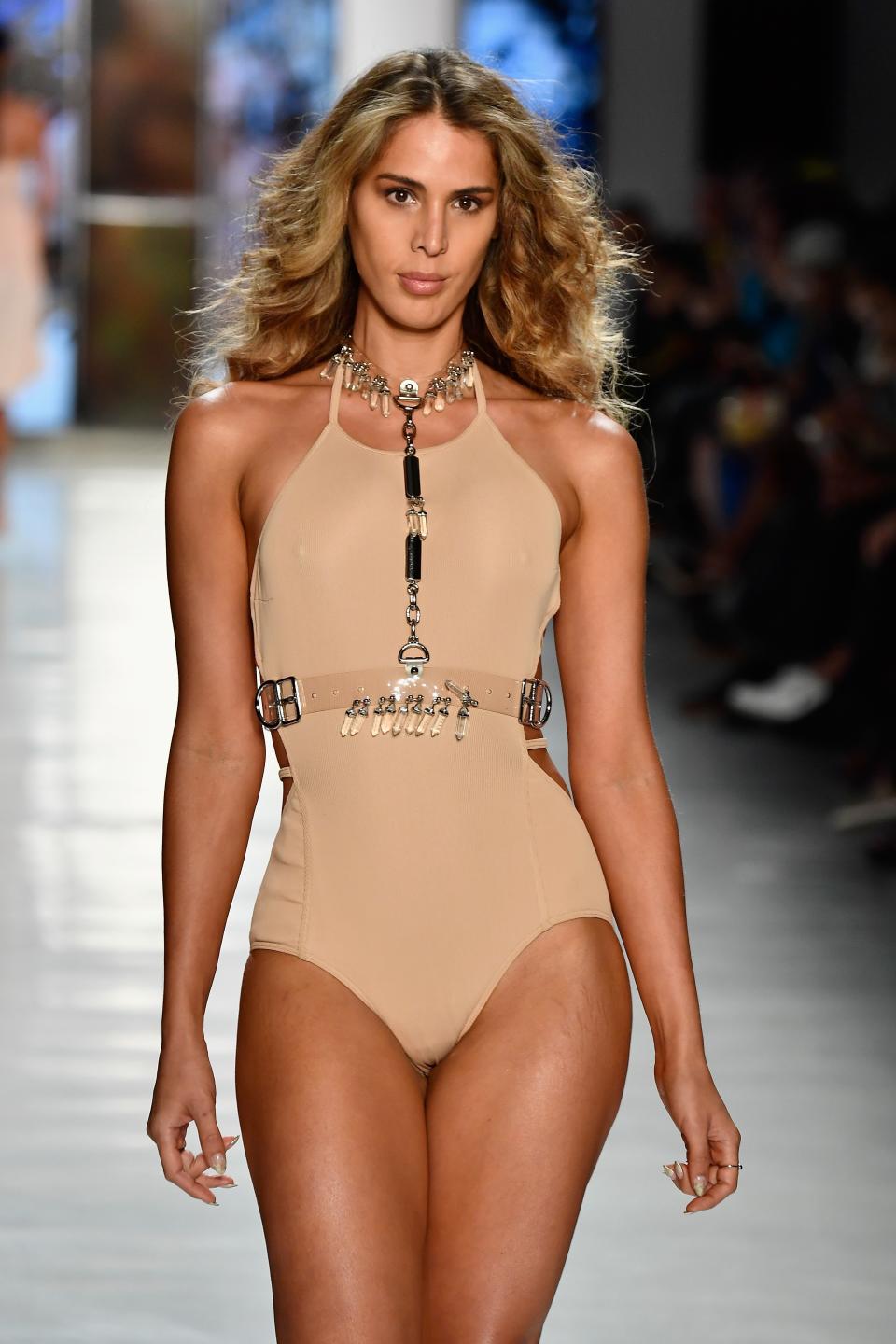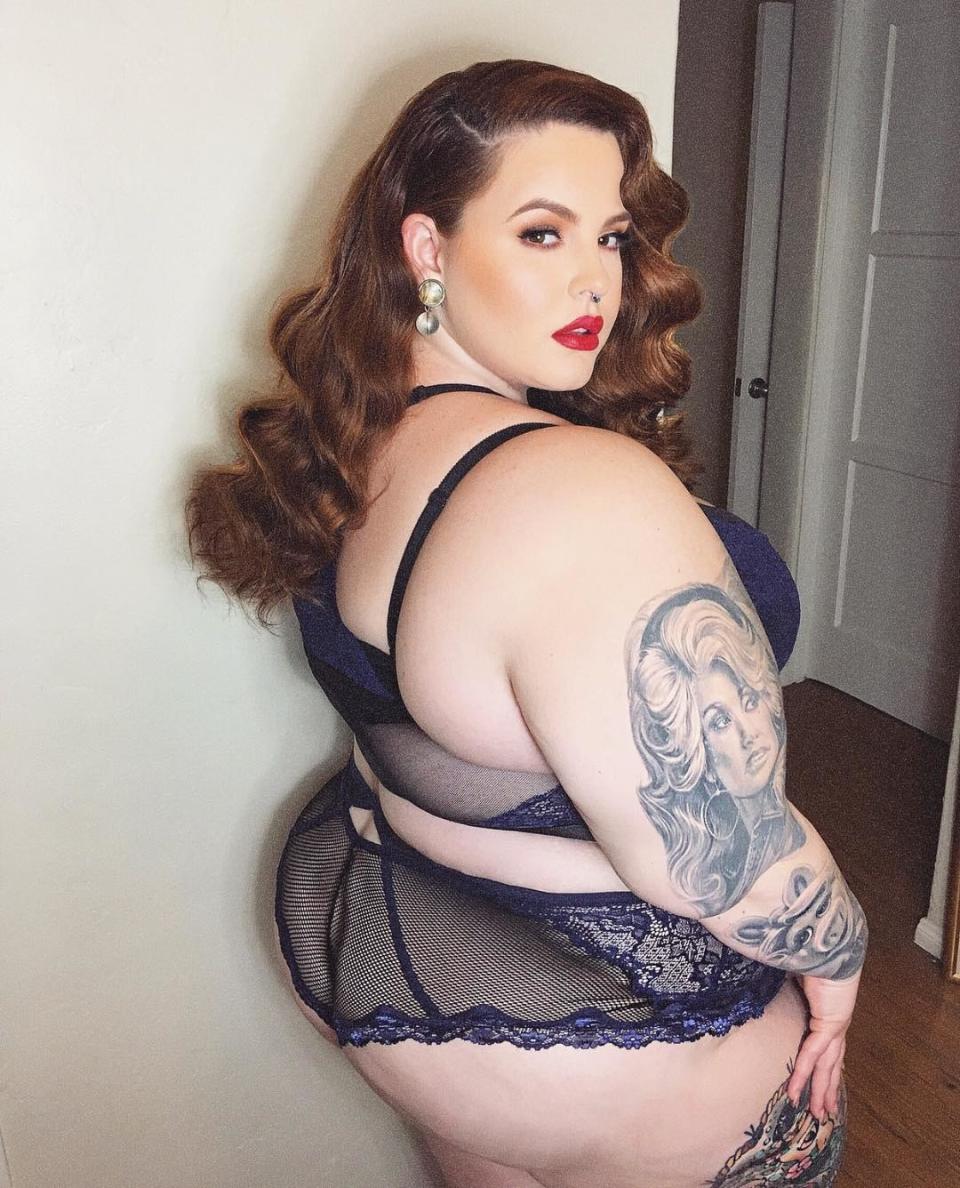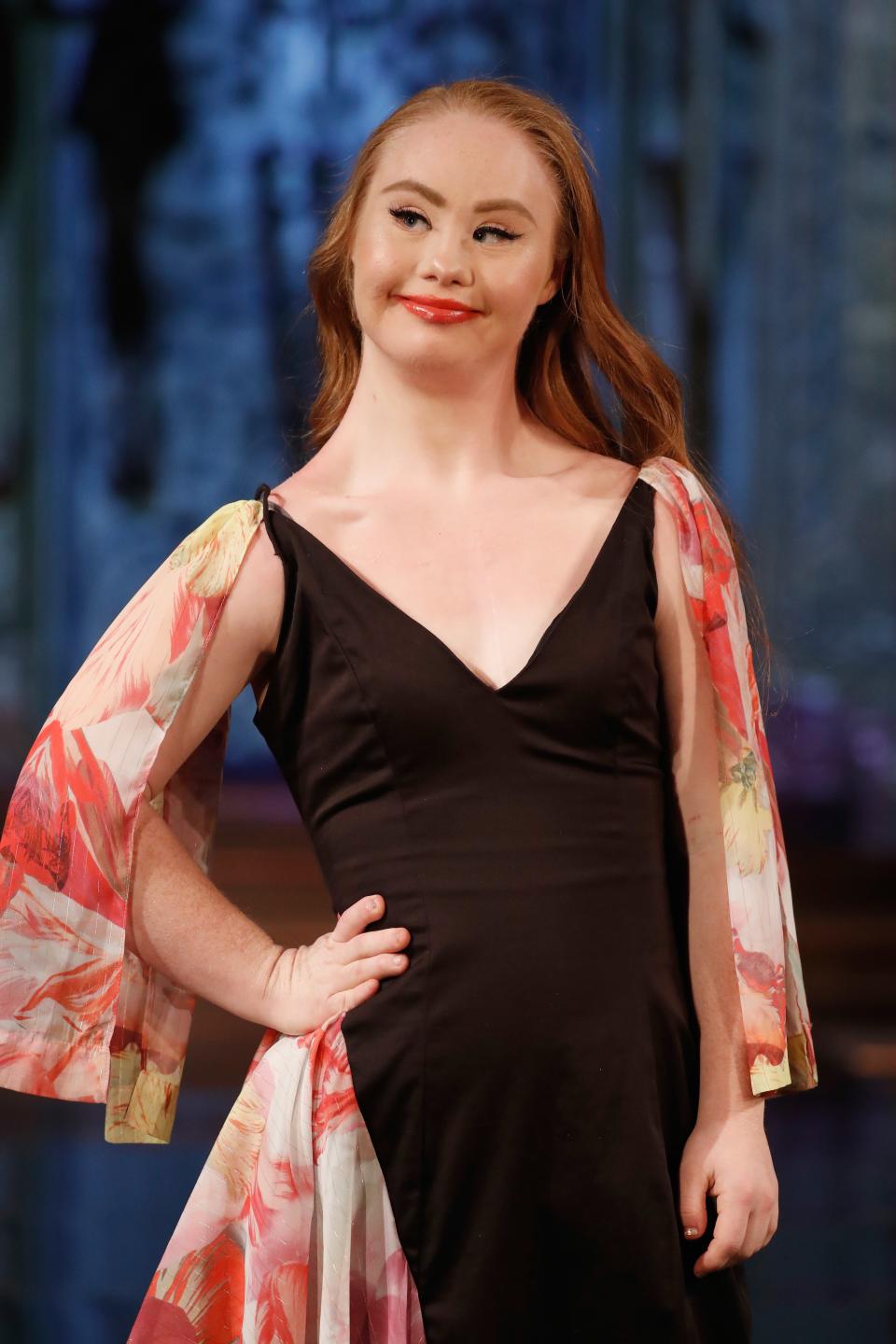Potential Victoria's Secret Fashion Show Plus-Size, Transgender, and Disabled Models Speak Out
The Victoria's Secret Fashion Show reportedly enjoys over 800 million viewers across 190 countries. But despite its popularity, it fails to adequately represent the audience it claims to serve. The lingerie behemoth is based in America, where the average woman is a size 16/18 — yet in 23 years, the brand has failed to cast a single plus-size model. And there's no shortage of beautiful, capable plus-size models who are willing to work with Victoria's Secret. In 2015, model Tess Holliday shared an image of herself in lingerie with the caption "If Victoria's Secret needs a plus-size angel, call me. (P.S. DUH us fuller ladies like to wear lingerie and look sexy. Get with it)." A year later, Ashley Graham posted an illustration of herself as the first plus-size model at the Victoria's Secret Fashion Show that garnered over 150,000 likes on Instagram. The brand didn't respond to either post.
Though the transgender and non-binary community is finally gaining more visibility at Fashion Weeks across the globe, landing a record 91 runway spots during the Spring 2019 season, Victoria's Secret has never cast a transgender model for the fashion show or even for their ad campaigns. In 2013, over 50,000 people signed a petition urging Victoria's Secret casting directors to consider transgender model Carmen Carrera; that petition went ignored by the brand. Just this April, Leyna Bloom launched a Twitter campaign to become the first transgender woman to be cast in the runway spectacular. "Trying to be the first trans model of color to walk a Victoria's Secret Fashion Show," she tweeted, garnering over 100,000 likes and 34,000 retweets. She's a regular on the Chromat runway, but has yet to be contacted by Victoria's Secret.
The fashion industry still has a long way to go in terms of representation for disabled models, but progress is being made. During the Spring 2019 season of Fashion Week, disabled models like Mama Cax and Madeline Stuart hit the runway, Jillian Mercado, Chelsea Werner and Mama Cax covered the September issue of Teen Vogue, and Chella Man became the first deaf transgender model to sign to IMG. In an interview with Teen Vogue, Madeline Stuart expressed her desire to become the first Victoria's Secret model with down syndrome, calling it her "biggest dream." Her comments went ignored.
While Victoria's Secret has made some effort to diversify their model cast in recent years, enlisting the first model with Vitiligo (Winnie Harlow) and the first Filipino model (Kelsey Merritt) for this year's show, there are still several marginalized groups that are glaringly absent from the runway. In a recent interview with Vogue, Ed Razek, the chief marketing officer of Victoria Secret's parent company, explained why they don't cast transgender models. "Shouldn’t you have transsexuals in the show? No. No, I don’t think we should," he said. "Well, why not? Because the show is a fantasy. It’s a 42-minute entertainment special. That’s what it is. It is the only one of its kind in the world, and any other fashion brand in the world would take it in a minute, including the competitors that are carping at us. And they carp at us because we’re the leader." (According to GLAAD, transsexual is not an umbrella term, and the term transgender is preferred.) Ed has since offered an apology, but the damage is done — several former supporters of the brand are already organizing a boycott.
Leyna Bloom took to Instagram Saturday morning to respond to Ed's statement, saying: "If you support this and this brand, you support transphobia and you are part of the problem in the world. Hate has caused a lot of problems in the world, but has not solved one yet." Carmen Carrera addressed the statement as well, pointing to the brand's declining sales as evidence they need to make a change. "All of this “Holier than thou” casting process isn’t helping the company either," she wrote on Instagram. "Their sales have been on a steady decline since 2016 and I hope they change that real soon! If they are ready for a positive change with a big impact, they know where to find me!"
Ahead of the 2018 airing of the VS Fashion Show, I talked to Leyna, Carmen, and other major models from underrepresented communities to discuss why — despite reports of dwindling sales and the success of inclusive lingerie brands — Victoria's Secret still isn't listening.
Carmen Carrera, Transgender Actress, Activist, Television Personality and Wilhelmina Model

Chromat - Runway - SS18 Fashion Week
Getty ImagesTeen Vogue: Why is it important to have transgender representation on a runway like Victoria Secret's?
Carmen Carrera: It’s important to have transgender representation because we represent the forthcoming generation, and their new perception on the standard of beauty — which I believe is being true to yourself, loving yourself and others. It’s also about being more aware, socially, and shedding a light on all marginalized groups. It’s beyond the surface beauty.
But if you look at Victoria’s Secret models, honestly, young girls don’t necessarily look up to them for the healthiest reasons. It’s more about the envy, the desire to look aesthetically best: it’s an unattainable, elitist mindset. Those models are basically there just because they look good. It doesn’t go much deeper than that. Having a transgender girl up there who works just as hard to maintain her mind and body, but also heart, soul, spirit, life, transition, perseverance, and will to survive? That’s representation that all women can look up to! We are a positive example of how to break through the boundaries that hold all women back in the first place. We are heroes. We’re champions of our own triumphant stories, which people love, and that just comes along with us being us.
TV: The petition created for you clearly shows there’s a desire for transgender representation on the Victoria's Secret runway. Why do you think the brand has still been slow to embrace diversity?
CC: I think that Victoria’s Secret is afraid, and they’re unwilling to take a risk. I think we are seen as a liability rather than the amazing opportunity we truly are. I think by them not including us, it's sending a dark message and contributing to the ignorance and hate that exists today. They as a company have the power to give us the opportunities that we need to thrive, and to actually set the record straight on who we are to the world at large. They need to stop looking at us as a liability, and instead look at us as potential for positive change in the world. Because that’s who we’ve always been. It almost feels like they’re waiting for us to become famous enough on our own until they have no choice but to include us, but the reality is that’s almost impossible without help and support from companies like them in the first place. It’s hard for us to thrive without the resources. We’re so disenfranchised: we barely have equal rights and federal protection. They have the power and potential to help change that.
TV: Watching the Victoria's Secret Fashion Show growing up, how did it feel to have the transgender community excluded?
CC: Growing up, I didn’t really watch the Victoria’s Secret fashion show too much. I really just saw folks who weren’t real to me, so it didn’t really interest me. And, at that time, it felt like it was made for men’s interest, so I didn’t really identify with it. This brand has been built on misogyny and indulging/provoking men. It’s time for them to acknowledge their history and stop catering to men, and start catering to women. If this show was really for women, we would all be in it.
TV: What are some model lingerie brands that embrace the transgender community in an authentic way?
CC: I don’t know any lingerie brands that really embrace transgender women at all, to be honest.
TV: What impact would it have on Victoria's Secret Fashion Show viewers to see a transgender model walk the runway?
CC: I think people would celebrate us. There wouldn’t have been a petition for me to walk the show and CNN Worldwide wouldn’t have covered the story if there weren’t people rooting for us. I think it would be a conversation starter, too, and could open up a lot of people’s eyes who aren’t otherwise exposed to the transgender community.
TV: How can we continue fighting for transgender representation at Victoria's Secret and other brands?
CC: By supporting us! Supporting visible transgender people who are trying to make a difference is huge. Also, reach out to brands directly. Get your friends together and tweet, write letters, do whatever you can to get in touch with the brands you like and care about and tell them how you feel, and encourage them to include more transgender models like myself!
Tess Holliday, Plus-Size Model and Founder of Eff Your Beauty Standards

Teen Vogue: Why is it important to have plus size representation on a runway like Victoria Secret’s?
Tess Holliday: Diversity is important in the industry because there’s not just one kind of body type. Change only happens when there’s more representation in the industry.
TV: The response to your Instagram post clearly shows theres a desire for plus size representation on the Victoria's Secret runway. Why do you think the brand has still been slow to embrace diversity?
TH: I guess maybe Victoria's Secret doesn’t like money because there’s a lot of money left on the table. VS has always catered to a certain kind of look and sells this idea of a dream to mass consumers. [That dream] doesn’t involve being plus size which is not reality and that’s unfortunate.
TV: Watching the VS show growing up, how did it feel to have the plus size community excluded?
TH: I never watched the VS Fashion show growing up because I knew at a very young age that I couldn’t shop there or wear anything so I didn’t put myself through it because I didn’t want to make myself feel bad. I can imagine for a lot of people growing up they feel bad when they only see one certain body type.
TV: What are some model lingerie brands that embrace the plus size community in an authentic way?
TH: A few of my favorites are Eloquii, ASOS, Hips and Curve, and Playful Promises. These brands show lingerie on different body types and embrace diversity.
TV: What impact would it have on Victoria's Secret Fashion Show viewers to see a plus-size model walk the runway?
TH: I think it would show viewers that there’s not just one way to be beautiful and that we all matter.
TV: How can we continue fighting for plus size representation at Victoria's Secret and other brands?
TH: As much as I want VS, who’s the biggest lingerie retailer, to embrace plus size and more diverse body types, it's also important to give your time, focus, and money to brands who are actually doing what you want to see. It’s important to be vocal about the brands you do like and what they’re doing right because that’s who should get our money because they actually care about marginalized groups. Always support progressive brands.
Madeline Stuart, First NYFW Model With Down Syndrome

MADELINE STUART 21 REASONS WHY At New York Fashion Week Powered By Art Hearts Fashion NYFW
Getty ImagesTeen Vogue: Why is it important to have representation for people with disabilities on a runway like Victoria's Secret’s?
Madeline Stuart: It is important for big brands to represent every type of person as it is the big brands like Victoria's Secret that mold the industry and [set] trends for smaller brands to follow. They are the ones that can really steer our fashion industry in a positive direction.
TV: Have you been approached by Victoria's Secret since your statement about walking in the show?
MS: Unfortunately at this stage, we have not been approached but this year they did sign Winnie Harlow so we are hopeful that with time, it will happen.
TV: The response to our interview clearly shows theres a desire for representation for people with disabilities on the Victoria's Secret runway. Why do you think VS has still been slow to embrace diversity?
MS: Things are slowly changing and moving in the right direction. Like every other milestone in history, things take time. Things are so much better now then even 12 months ago [in terms of] diversity.
TV: What are some model lingerie brands that embrace the disabled community in an authentic way?
MS: There are many companies now using diverse models in every country: Fig Leaves and Curvy Kate in the UK, Surge which is Mens, Parfait in Europe, Lonely Lingerie from NZ, NATO, Aerie and Lane Bryant in the US to name a few.
TV: What impact would it have on Victoria's Secret Fashion Show viewers to see a model with a disability on the runway?
MS: The more diverse models you see on any runway or in campaigns, the more life becomes inclusive. It is important that everyone feels equal and the only way that will happen is by representation in every area of life including the fashion industry which has such a huge impact on the future generations.
TV: How can we continue fighting for disabled representation at Victoria's Secret and other brands?
MS: By magazines and news reports like this bringing awareness to the issue, we will eventually have a world where diversity is not newsworthy as it will just be a normal part of life. We are so excited for the day that this happens.
Leyna Bloom, Transgender Model, Actress, Dancer, and Activist

Teen Vogue: Why is it important to have transgender representation on a runway like Victoria's Secret’s?
Leyna Bloom: It’s important to have transgender representation on the Victoria's Secret runway, on every runway, and in every human sphere, in and outside of fashion. We are capable and beautiful, and we are setting new boundaries in mainstream fashion. We won’t just be the buyers of your brands anymore. We want to be included in every aspect of the fashion world, from production to advertising. Transgender women have bodies and wear underwear just like everyone else.
TV: The response to your tweet clearly shows there’s a desire for transgender representation on the Victoria's Secret runway. Why do you think Victoria's Secret has still been slow to embrace diversity?
LB: To be honest, I’m not sure. Maybe because this is the start of a change in the fashion world, and they are waiting to see how they can contribute or how to catch up. This is super disappointing and ignorant because the right thing is to be a part of what’s changing the world for the better since you are one of the major leaders that could change it. Refusing to join us could be harmful for the brand long term, and I don't want that because I grew up loving everything VS.
TV: Watching the Victoria's Secret show growing up, how did it feel to have the transgender community excluded?
LB: Transgender people not being included in fashion has been completely normalized for me. It’s something I’ve sadly become accustomed to. I have faith that what I'm doing will help. And I hope I inspire people to know that there's a problem and a solution. Changing the world to help and include everyone shouldn't be a trend; it's in our nature and humanity.
TV: What are some model lingerie brands that embrace the transgender community in an authentic way?
LB: Off the top of my head, there’s only one I can think of: Chromat, which is the leader of inclusion in fashion yesterday, today, and tomorrow. Many brands have now followed their leadership and I’m so proud to be a part of it.
TV: What impact would it have on Victoria's Secret viewers to see a transgender model walk the runway?
LB: It would be a gasping-for-air, wow moment for me and for everyone I know, a mind-opener that the world is in fact on the verge of abundant change. It will show people it’s OK to be special: these are the bodies and faces of the missing links in society. More people will love themselves, because they’ll see someone that is included that’s just like them. In order to change the world, you must go to the person who has the least opportunity and representation and give them a hand because they need it the most.
TV: How can we continue fighting for transgender representation at Victoria's Secret and other brands?
LB: More brands — big brands and smaller brands — should hire transgender workers: stylists, hair stylists, makeup artists, photographers, editors, assistants, designers, casting directors, etc., and include more transgender talent. That means we need modeling agencies to hire black transgender models, not just white transgender models. There are almost no transgender models of color signed to any major modeling agency. There are only white transgender models working consistently in the fashion world. It’s not just VS; it’s the majority of the fashion world. We all can do our part and help change it, and VS can be the break we need. If not them, then who?
Get the Teen Vogue Take. Sign up for the Teen Vogue weekly email.
Want more from Teen Vogue? Check this out: Savage X Fenty Was Everything the Victoria's Secret Fashion Show Should Be

